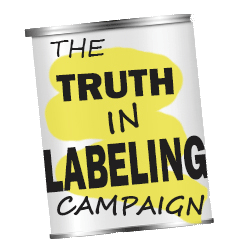Over the past few years, Edelman PR has done its utmost to come up with wild and crazy campaigns for one of its major clients, Ajinomoto, the world’s leading manufacturer of monosodium glutamate.
Recent efforts include calling those who avoid MSG racists, a boot camp to teach bloggers and journalists how to promote MSG, having an online dictionary change the definition of “Chinese Restaurant Syndrome,” and managing to place obvious advertising segments promoting MSG in major networks masquerading as news. Ajinomoto even attempted to butter up the U.S. Department of Agriculture to come up with a “study” claiming MSG helps you to lose weight.
The latest is beyond absurd. And once again, Ajinomoto and Edelman are working hard and spending big bucks to try and give prime time to what we call the Six Big Fat Lies About MSG.
The organic metrics for this stunt, called CancelPizza, indicate it wasn’t very successful. However, we feel obligated to respond to yet another episode of MSG misinformation by countering it with the truth. Let’s connect the dots.
A ‘Trojan horse’ of hype
As is usual for Edelman PR, they don’t just create these schemes for their most-loved client Ajinomoto without bragging about it to anyone who will listen. In this case, the PR firm issued both a press release and several interviews about its campaign dubbed #cancelpizza.
As told to an industry-geared online publication, Edelman stated “We held our noses and studied the conspiracy content that tended to go viral.” It then attempted to create a “conspiratorial basement dweller aesthetic” in an “extremely sneaky campaign.”
The campaign consisted of a string of TikTok videos that were designed to “spread a slow-burn, incendiary campaign online” (again, in its own words) to “cancel pizza.” Why? According to Edelman, “If people are going to cancel monosodium glutamate, then we must also cancel foods where MSG naturally occurs…like pizza” (more on this, one of Ajinomoto’s Big Fat Lies, in a minute).
The campaign was indeed so sneaky, involving a “trove of influencers to fan the flames,” that it appeared to violate the Federal Communications Commission (FCC) rules regarding providing clear notice to indicate paid advertising. (FCC, where are you?)
Edelman summed up its “creative genius” as “a straightforward science lesson inside the Trojan horse of a TikTok conspiracy theory.”
But despite all the planning, money, and self-congratulatory statements, it came across as an actor reading a script and yelling about pizza and MSG. Nevertheless, Edelman managed to once again repeat Ajinomoto’s Six Big Fat Lies.
So, here are the real facts versus what Ajinomoto and its PR firm are hoping you’ll believe.
Fiction: Monosodium glutamate occurs naturally in food.
Fact: MSG is manufactured using genetically modified bacteria that excrete glutamic acid through their cell walls. In the United States, monosodium glutamate is produced in Ajinomoto’s plant in Eddyville, Iowa.
There have been hundreds of patents issued regarding the manufacture of MSG, which is a man-made product. One of the latest applied for by Ajinomoto was published by the US Patent and Trademark Office in December of 2023 and covers an improved method of producing “a free” L-amino acid “such as L-glutamic acid,” from Coryneform bacteria.
Proving once again that there is nothing “natural” about MSG.
Fiction: The glutamate contained in MSG is identical to the glutamate in the human body.
Fact: The glutamate in the human body is L-glutamate. L-glutamate, only. The glutamate of any manufactured glutamate (found in monosodium glutamate and pea protein isolate, for example) is made up of both L-glutamate and D-glutamate plus unwanted by-products of production called impurities. And since industry has not found a way to remove the unwanted impurities from processed free L-glutamate, the glutamate in MSG will always come with impurities.
Fiction: MSG is naturally made, similar to yogurt, vinegar, and wine.
Fact: MSG is manufactured using genetically modified bacteria that excrete glutamic acid through their cell walls. The only similarity to yogurt, vinegar, and wine is that their production includes fermentation.
Fiction: MSG has been used for over a century without adverse reactions.
Fact: The statement that MSG has been used for over a century without adverse reactions is a bald-faced lie. Since 1968, there have been copious reports of brain damage, endocrine disorders, and adverse reactions following ingestion of MSG; and the glutamate cascade has been implicated in such disease conditions as addiction, stroke, epilepsy, degenerative disorders (Alzheimer’s disease, ALS, and Parkinson’s disease), brain trauma, neuropathic pain, schizophrenia, anxiety, and depression.
Fiction: It must be safe since the FDA has said so.
Fact: The FDA relies on industry to determine what products are “safe.” Only when products are undeniably toxic, and claimed so by industry, or are not produced by Big Food or Big Pharma, will the FDA deem them unsafe.
The FDA does not order drug recalls, regardless of evidence of toxicity unless directed to do so by Big Food or Big Pharma. The FDA does no recalls on food or other non-drug items. When things get hot, so to speak, the FDA orchestrates a voluntary recall to be made by the manufacturer.
Fiction: MSG is very well researched and found to be safe.
Fact: Independent researchers have found L-glutamate to produce brain damage, endocrine disorders, and observable adverse reactions like migraine headaches, hives, and seizures.
Those studies that claim to have demonstrated monosodium glutamate safety have been rigged to fail to produce evidence of toxicity.
Claims that “authoritative” bodies or “well-respected international agencies” have found MSG to be a harmless food additive are false. Neither independent scientists nor independent regulators have deemed monosodium glutamate safe. FDA studies, which were actually reviews, have always been staffed by those with ties to the glutamate industry.
The regulators and/or authoritative bodies cited by the glutamate industry did no research of their own, but were given copies of FDA opinions on MSG safety or were provided review information by Ajinomoto, its not-for-profit corporations, and/or its agents — the International Food Information Council (IFIC) and the International Life Sciences Institute (ILSI), for example. And the vast body of published research demonstrating monosodium glutamate toxicity was not shown to them.
To learn more, download or order The Perfect Poison, by Adrienne Samuels, Ph.D. at Amazon.


